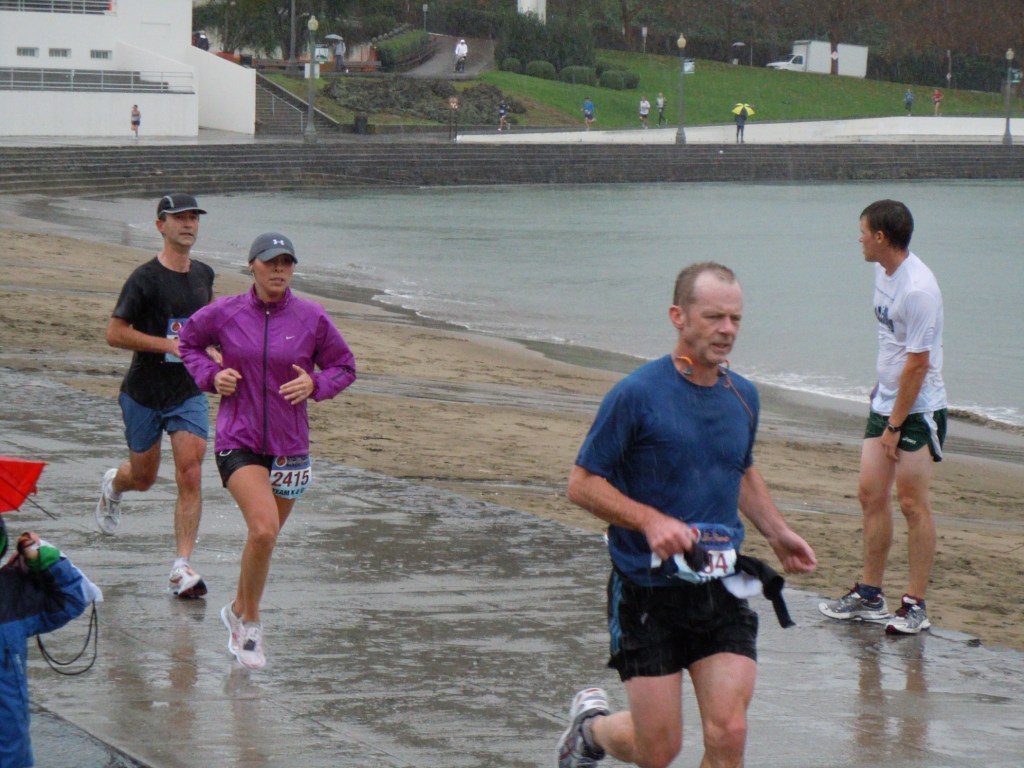One concept I teach athletes in Mindfulness Skills Training is the concept of developing a “Teflon Mind.” “Teflon is a nickname given to persons, particularly in politics, to whom criticism does not seem to stick.” (Wikipedia) Having a Teflon Mindset can be especially helpful when dealing with tough race conditions. Today, the California International Marathon faced grueling winds, down pours, flooded streets, and cold temps and I could not help but think of how these conditions would make any sensible athlete (if one exists) decide to stay indoors. However, I know for a select few runners who raced and faced these conditions today have cultivated their Teflon Mindset. They increased their ability to successfully finish, stay their pace, listen to their body, control self-talk and reactions, and face conditions with fierceness and mental toughness.
Okay so what is Teflon? Well according to Wikipedia: “PTFE aka Teflon is used as a non-stick coating for pans and other cookware. It is very non-reactive, partly because of the strength of carbon–fluorine bonds, (we triathletes like carbon) and so it is often used in containers and pipe work for reactive and corrosive chemicals. Where used as a lubricant, PTFE reduces friction, wear, and energy consumption of machinery.”
Can we see how developing a Teflon Mindset can give us a definite advantage for controlling negative experience or reactions to unexpected race situations, and therefore allowing our “machinery” to work more efficiently. Developing a Teflon Mindset is a concept that is developed as a part of Core Mindfulness Skills. I would recommend reading my previous post, Mental Skill of Mindfulness Training to get a base for how this skill is incorporated.
One unique aspect of my mental skills coaching approach is that I have significant clinical training and experience in Dialectal Behavior Therapy (DBT) developed by Marsha M. Linehan, an American psychologist and author. Not many and very few sport psychologists/mental skills coaches have clinical training and experience in DBT. I have adapted much of the mindfulness skills training concepts from this model, including developing a Teflon Mindset.
So what is a Teflon Mindset? To have a Teflon Mindset is developing the ability to allow experiences, feelings, and thoughts come into your mind and slip right out. When you think about it, Teflon is a substance, which creates a non-stick surface when applied to various materials. So, to have a “Teflon Mind” is another way of saying, “let go of troubling thoughts that stick to your mind.” The goal here is to stay in the present moment. Many have found that this is a way to cope with intense feelings. Distressing events and emotions easily become stuck in consciousness. “Teflon Mind” is a way to attend to painful thoughts or intense sensations without allowing yourself to get pulled into reacting to it, and therefore getting stuck to them. The goal is to observe and notice your experience in a nonjudgmental way, without reacting, and then letting go.


For example, when I raced the US Half-Marathon in SF last year the conditions were similar to today. I remember thinking to myself “I’m committed. I will be uncomfortable. I can handle this.” During the race I had to train myself to notice but not react to the tightness in my quads, soaked running jacket, chafing in my inner thighs, and water logged shoes. I remember noticing these things but staying to myself, “Be here. Be now. Look ahead and keep running.” I was very non-reactive and non-judgmental to these very uncomfortable and non-ideal conditions. But because I have practiced the mental skills so much they have become a part of me and a part of my race mentality.
Developing a Teflon Mindset takes continued practice and training, just like getting faster in your swim, bike, or run, or other particular sport, requires continued practice and training. If you are interested in developing a Teflon Mindset contact me for more information and feedback.
Special note to Northern California triathletes doing Ironman Lake Tahoe in September 2013 – I will be offering a once a month, three-month program, focusing on developing mental skills, limited to 12 athletes. Details to come. Please contact me if you are interested.




Thank you! I hope more mental skills coaches follow suit and increase exposure and training in DBT. It’s been invaluable to my athletes.
Reblogged this on IN FOCUS and commented:
Excellent post about Mindfulness…
Great, great post. A mindful, present athlete is a happy athlete. I definitely echo your fondness for DBT and stand behind your call for an increase in mindfulness training. Well-done.